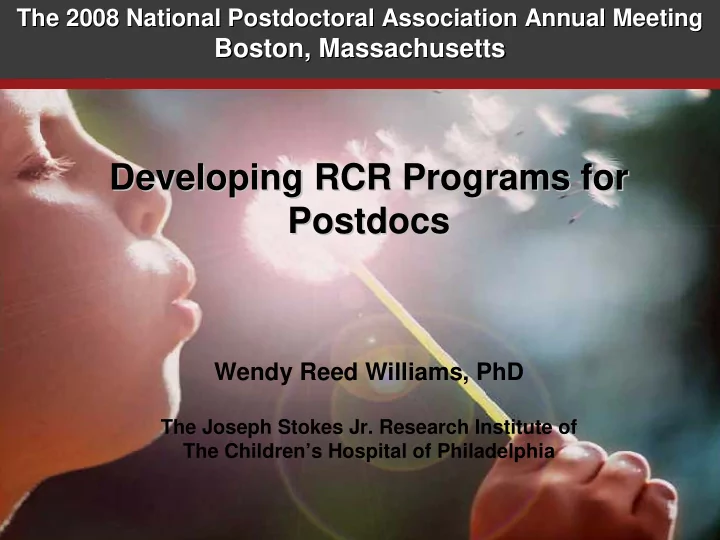

The 2008 National Postdoctoral Association Annual Meeting The 2008 National Postdoctoral Association Annual Meeting Boston, Massachusetts Boston, Massachusetts Developing RCR Programs for Developing RCR Programs for Postdocs Postdocs Wendy Reed Williams, PhD The Joseph Stokes Jr. Research Institute of The Children’s Hospital of Philadelphia
Session Agenda I. RCR Programs for Postdocs: A Primer on Instructional Design II. RCR at CHOP: Five Years and Counting
Instructional Design Methodology Assess Getting Started Design Mapping It Out Develop Assembling the Pieces Deliver Conducting the Training Evaluate On-Going Review
Step 1: Assess • Determine need (surveys) • Obtain buy-in, institutional support • Identify available resources • Evaluate existing trainings, feedback • Examine budget- Seek outside funding as needed
Desired Outcomes Audience Step 2: Design Launch Plan Format Scope Objectives
Format Options • Seminar series Semester course Lecture • Small group discussions Seminar series • Semester course Blended Lab meetings Online Small group discussions
Format Considerations • Time of day • Overall time commitment • Amount of information • Preferred learning style • Accessibility
Step 3: Develop Develop content s e t i i v i c t a n h c a n l u P a l e z a l i n i F Produce materials participants Invite Recruit presenters Design evaluation
Content Development • Customize • Stress resources- where to go for help? • Include opportunities for interactivity/dialog • Engage faculty to participate • Connect RCR topics with daily experiences
Pre-Launch • Advertise well • Send reminders • Be organized
Step 4: Deliver • Establish a positive learning environment • Achieve objectives • Engage participants • Allow time for questions • Summarize central concepts • Provide incentives • Distribute an evaluation • Track attendance
Step 5: Evaluate • What worked, what didn’t? • Did we meet our objectives? • Review learner comments • Incorporate feedback
Five Years and Counting RCR at CHOP:
The Joseph Stokes Jr. Institute US News & World Report/Child Magazine- #1 pediatric hospital in the US Joseph Stokes Research Institute- research arm of CHOP Department of Research Education- training and postdoc affairs office
Step 1: Assess Phase I: • Review of UPenn RCR course • CHOP postdoc survey • Pilot with T- and F-32s Phase II: • Presentation of pilot data to administrative and faculty leadership • Implementation of an expanded, institutional requirement • Estimated costs included in FY budget
CHOP RCR Requirement RCR instruction required for the following: • T-32 and F-32 fellows • K-12 and first year K-series awardees • 2nd year postdocs • MD fellows conducting research *One-time requirement developed, managed and tracked by Research Education
Step 2: Design Audience: 115 postdocs 200 MD fellows • How do we get them out of the lab? • How do we cater to a diverse audience? – Basic, clinical, and behavioral – Foreign nationals • How can we demonstrate relevance to professional success in science?
Training Objectives • Institutional Objectives – To create and deliver RCR course meeting NIH and institutional requirements – To incorporate best practice strategies into delivery of training curriculum • Learner Objectives – Understand the federal and institutional ethical standards and guidelines for the responsible conduct of research – Recognize importance of RCR for successful career in science
The Evolution of RCR Training 2007- -present present 2007 2004- -2005 2005 2004 • Learner-centered, • Expanded requirement to interactive format include all trainees • 6 hours, offered 3 • Day long, all lecture times per year 2003 2004 2005 2006 2007 present 2005- -2006 2006 2005 Pilot 2003- -2004 2004 Pilot 2003 • Day long, all lecture • Nine 2 hour sessions • Offered twice per year • Offered monthly • For T-32s only
Step 3: Develop Research Misconduct Use of Human Subjects Peer Review Conflict of Interest Animal Care and Use Publication Practices Mentor/Trainee Collaborative Science Responsibilities Intellectual Property Responsible Authorship Data Management Acquisition and Sharing
For Each Topic… • CHOP policy • Federal regulations • Key practices • Skills to manage concerns • Institutional contacts • Additional resources • Cases
Content Resources
Putting the Pieces Together Assemble Portfolio Continue Online Registration Recruit faculty Develop Evaluation
Step 4: Deliver
Reminders Pre-Launch Checklist
Pre-Assessment • Defines audience • Prepare speakers • Teach-back tool
RCR Trivia Slide Show
Roundtable Discussions Brief Lecture Delivery Strategies Panel Presentation
Step 5: Evaluate • Shorten the day • Integrate online cases/pre-work • Continue to integrate learner feedback
Research Orientation Other RCR Offerings Speaker Series CITI RCR Courseware
RCR Wishlist • Expand online resources • Determine effectiveness • Implement faculty and staff RCR requirement • Enforce RCR concepts via institutional policy – Authorship – “Compact Between Postdoc Appointees and Mentors”
Final Thoughts S U R
Thank You! Questions? williamsw@email.chop.edu
Recommend
More recommend